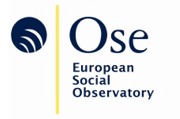The European Social Observatory (OSE), the European Environment Agency (EEA) and the European Trade Union Institute (ETUI) invite you to a second webinar for the launch of the 22nd edition of ‘Social policy in the European Union: state of play’.
Programme
Welcome and introduction: Nicola Countouris (Director of the ETUI Research department) and Bart Vanhercke (Director, OSE)
The European Green Deal: opportunities and prospects after the Covid-19 crisis
Hans Bruyninckx (Director, European Environment Agency)
Europe’s digital agenda: people-centric, data-centric or both?
Aida Ponce Del Castillo (Senior Researcher, ETUI)
Q&A with the audience introduced by Félix Mailleux (Advisor, ETUC), Catelijne Muller (President ALLAI and AI-Rapporteur, European Economic and Social Committee) and Sebastiano Sabato (Senior Researcher, OSE)
Conclusions, Slavina Spasova (Senior Researcher, OSE) and Bart Vanhercke, editors
EN/FR interpretation will be available.
Climate change is flexing its muscles (floods, droughts, tornados,...) and striking indiscriminately. The threat of climate change will require changes in the ways in which we produce, consume, and organise our societies. The EU’s response to climate change and the much-needed, fundamental transitions is the European Green Deal. Can its implementation roadmap achieve the EU’s climate targets? Can European societies grow in quality, rather than quantity, and in a more equitable way? And who are the winners and losers of the transition? These questions will be discussed by experts and policymakers, with active participation from the audience.
The digital transition is also at the heart of this event: how can digitalisation be moulded to benefit the climate and society – and not Big Tech? The pandemic has further highlighted the importance of digitalisation and spurred many developments in this area – with important consequences for work and social policies and thus triggering responses from a variety of social stakeholders. These will be critically reviewed during the event and difficult questions raised. ‘New’ movements and players in the digital area are gaining a say in the process: is their influence becoming greater than that of trade unions?
